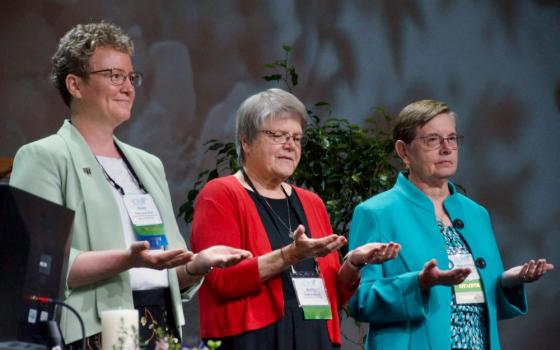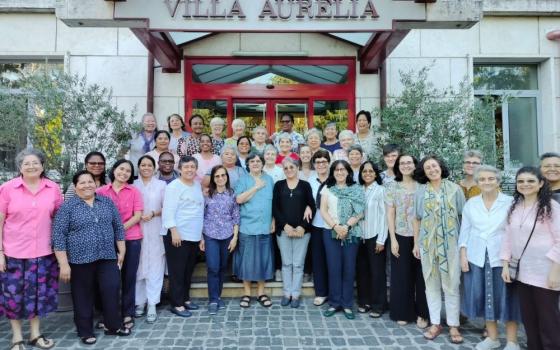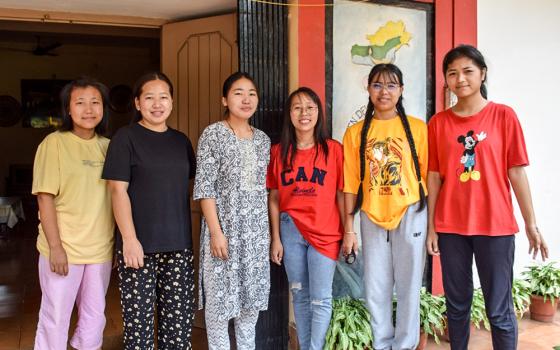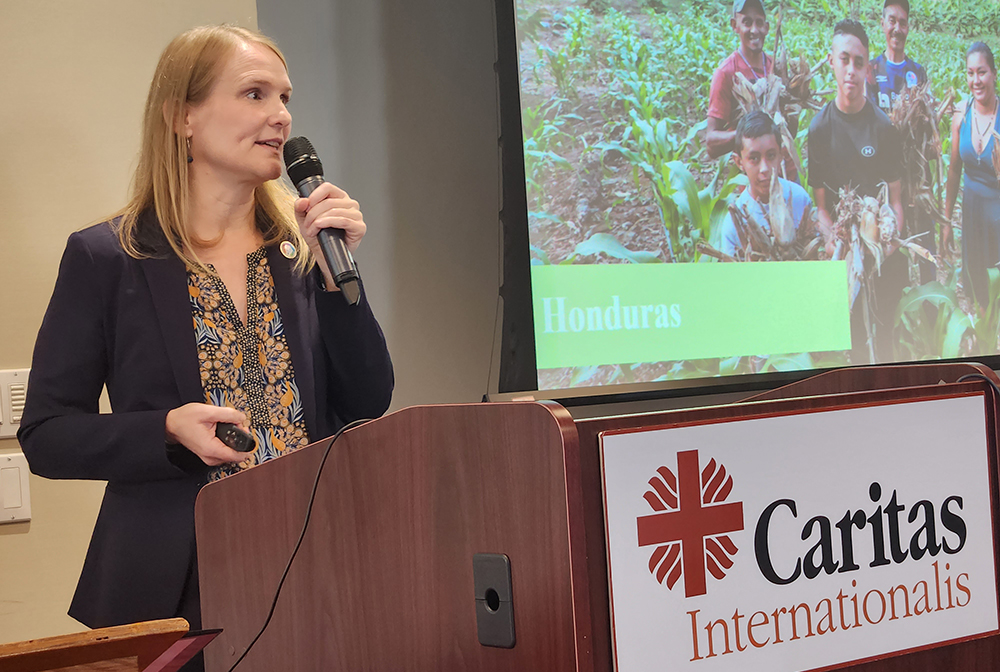
Julie Ideh, a global technical advisor of agriculture and livelihoods at Catholic Relief Services, was the keynote speaker at a Nov. 17 event at the Church Center for the United Nations focused on global poverty. (GSR photo/Chris Herlinger)
A new report by Fordham University analyzing global poverty trends through the lens of statements by Pope Francis and others says that while extreme poverty may be declining from the effects of the COVID-19 pandemic, other serious problems continue to vex the global community.
Among the continued challenges cited in "Fordham's Pope Francis Global Poverty Report (2023)" are declining access for the economically poor to food, rising gender inequities and illiteracy, and increasing government restrictions on religious freedoms.
The report measured seven dimensions of human well-being "that respect the dignity of the poor and empower them to transform their lives and community," said Henry Schwalbenberg, a Fordham economics professor and editor of the study, which was released Nov. 17, ahead of the church's World Day of the Poor, commemorated on Nov. 19.
The 2023 study is the eighth study Fordham has conducted based on a concept originating in the Second Vatican Council of "integral human development" drawn from the writings of Pope Paul VI and philosopher Jacques Maritain, said Fordham research assistant Babalwa Nogwanya.
The idea was further developed by Francis in an address at the United Nations in September 2015. In that appearance, the pontiff outlined the seven indicators and affirmed the core idea that in order to escape poverty, "real men and women" must be allowed "to be dignified agents of their own destiny."
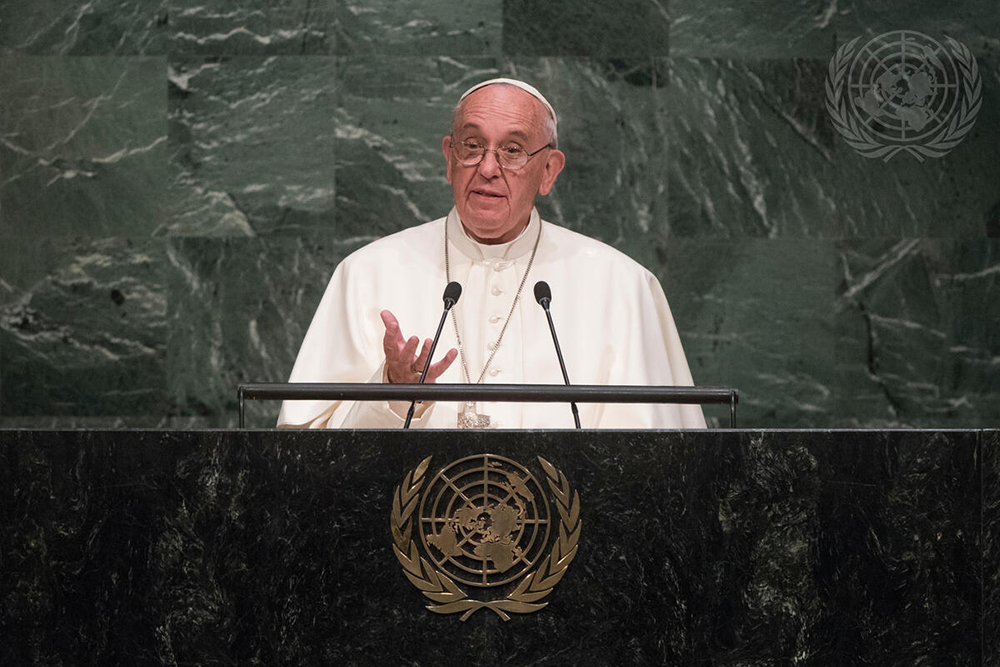
Pope Francis addresses the United Nations General Assembly during his visit to United Nations headquarters in September 2015. In his address, the pontiff outlined seven indicators of poverty. (Courtesy of Cia Pak/United Nations)
Based on recently available data culled from various sources, including the United Nations, researchers found that "serious gaps exist in all seven dimensions of poverty," Schwalbenberg said at presentation of the study at a release event at the Church Center at the United Nations co-sponsored by Fordham's graduate program in International Political Economy and Development, or IPED, which Schwalbenberg heads; Baltimore-based Catholic Relief Services; and the international Catholic humanitarian alliance Caritas Internationalis.
Among the named seven dimensions of poverty are four based on material needs: water, food, adequate housing and "above-subsistence" level of employment. The other three are what Nogwanya called "critical spiritual freedoms," including education, civil liberties and religious freedom.
In the Fordham study, the average of all seven gaps are combined into a "Global Poverty Gap," which in 2023 is currently, 26%, "a very slight improvement over last year," which was 26.2% said Schwalbenberg, noting that the overall gap was at its worst in 2022, due to the negative effects of the global pandemic.
Data indicate that the world "may be just starting to rebound from the negative effects of the COVID pandemic," Schwalbenberg said, including "almost complete recovery in employment from the COVID shock" and better data for access to water and housing.
At the same time, Schwalbenberg and researchers "are concerned about the continued high levels of government restrictions on religious freedom, the decline in literacy, and rising gender inequity," as well the "accelerating decline in the poor's access to food."
Fordham research assistant Harrison Yu-Zepeda said data indicate that about 9% of the world's population "lack basic access to food." That means that "just under three quarters of a billion people are continuously malnourished," he said.
Advertisement
That worry animated a keynote address by Julie Ideh, a global technical advisor of agriculture and livelihoods at Catholic Relief Services, who called the current global food crisis "unprecedented" for a number of factors — one being the effects of the COVID-19 pandemic.
"Many people's livelihoods and revealed the interdependence of our global systems as we saw supply chains breakdown as a result of lockdowns and low production," Ideh said of the effects of the pandemic. "People made less money and had less access to food or the means to produce food."
Other factors include the "devastating increase in impacts of climate change" in which, for example, she said, the Horn of Africa has grappled with four seasons without rain — "undermining normal patterns of food production but wiping out entire livelihoods and homesteads, often displacing people."
Similarly, Ideh said, "conflict has also revealed the risks of our interdependent global food systems." The war in Ukraine has affected grain supply and has driven up the price of fertilizer in many countries, she said, but added that conflicts in "Afghanistan, the Sahel (region of Africa), Sudan and now the devastating conflict in Israel and Palestine — all disrupt local and sometimes regional markets."
It is difficult for the global food system to withstand these shocks, Ideh said, adding that the various trends have caused inflation to climb.
"For those who already live within small margins, it becomes difficult to buy the basic needs — staples, oil, seeds and other inputs for the farm, not to mention paying for school fees and other priorities," she said. "Many families and communities face multiple shocks, compounding the impact of the last shock, year after year."
Ideh said strengthening collaboration and partnerships between producers, governments, humanitarian groups and the private sector can help alleviate these challenges.
But also important, she said, is empowering local food producers. "Resources need to get to local organizations," she said, noting that civil society groups and some nations "are calling for our global financial systems to be reformed from their colonial-era formulations."
Adrian Dominican Sr. Durstyne Farnan, who represents the Dominican Leadership Conference at the United Nations and who attended the Nov. 17 event, said several of the indicators were new to her, but noted that spiritual well-being, for example, can "play an important role in empowering the poor."
She told GSR that Francis' establishment of a day to remember those living in poverty is reason to be grateful, especially "at this season of Thanksgiving" in the United States.
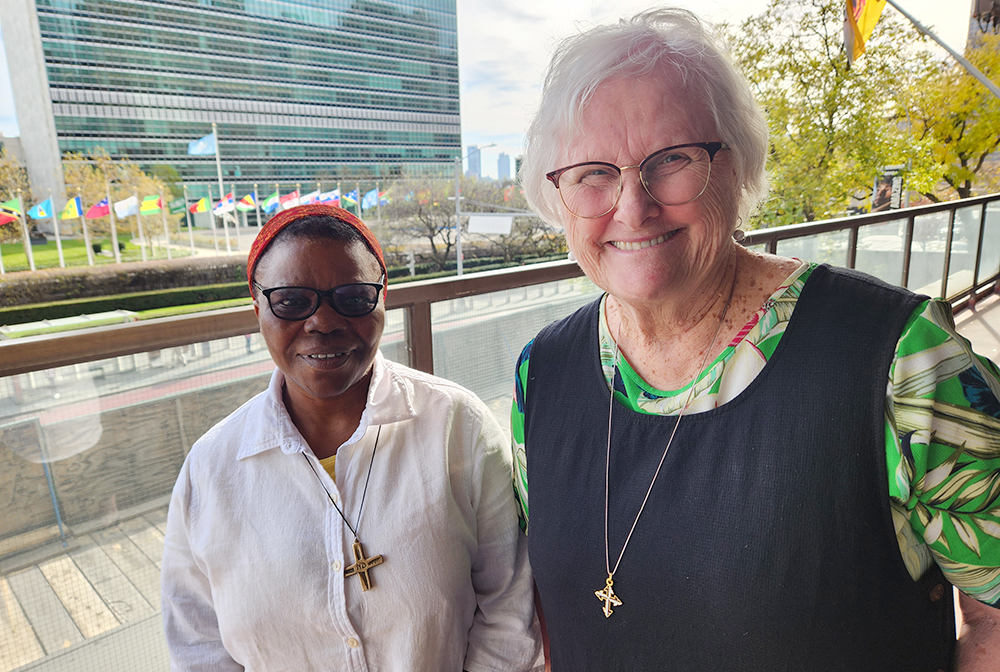
Adrian Dominican Sr. Durstyne Farnan, who represents the Dominican Leadership Conference at the United Nations, right, and Sr. Isabelle Izika, left, who represents the Sisters of Notre Dame de Namur at the U.N. were among the sisters who attended the release of the "Fordham's Pope Francis Global Poverty Report (2023)" at an event Nov. 17 at the Church Center for the United Nations in New York City. (GSR photo/Chris Herlinger)
Other Catholic sisters representing their congregations at the event said challenges posed by global systems must be addressed.
Sr. Isabelle Izika, who represents the Sisters of Notre Dame de Namur at the United Nations, said it is still confounding that a country like a resource-rich country like her native Democratic Republic of Congo, remains an economically impoverished country. "I have a hard time understanding how a country with so many resources can be so poor," she said in an interview. "Africa has been kept poor."
She added: "The so-called 'poor' are people who have knowledge, intelligence, resources and abilities. Allowing them to develop what they already have would be more beneficial and would advance people."
Sr. Mary Jane Caspillo, representing the Medical Mission Sisters, said in an interview that the newly released report is cause for reflection. "People are not just poor; they are made poor by the kind of system and structures we have," she said.
Caspillo, a Philippine sister, added: "I don't think the poor are 'a problem to be solved.' First and foremost, it is imperative that society respects them as human beings with knowledge and wisdom to contribute towards systemic and structural change."
In opening remarks at the Nov. 17 event, Msgr. Robert Murphy praised Francis' focus on poverty, saying "poverty comes in many guises, always vying for our attention: in faces marked by suffering, exclusion, oppression, violence, torture and imprisonment, war, deprivation of freedom and dignity, ignorance and illiteracy, medical emergencies and shortage of work, trafficking and slavery, exile, extreme poverty and forced migration, social injustice, loneliness or moral degeneration."
Pope Paul VI said those who are living in economic poverty "belong to the church by 'evangelical right' and require of us a fundamental option on their behalf," said Murphy, the deputy permanent observer of the Holy See Mission to the United Nations.
In pondering World Day of the Poor, and this year's theme, "Do not turn your face away from anyone who is poor,' people of faith must think," Murphy said, "of our daily encounter with the poor and those in need … (and be) challenged: How can I, how can we, help to eliminate or at least alleviate exclusion and suffering? What can be done to meet the spiritual need of the poor?"

